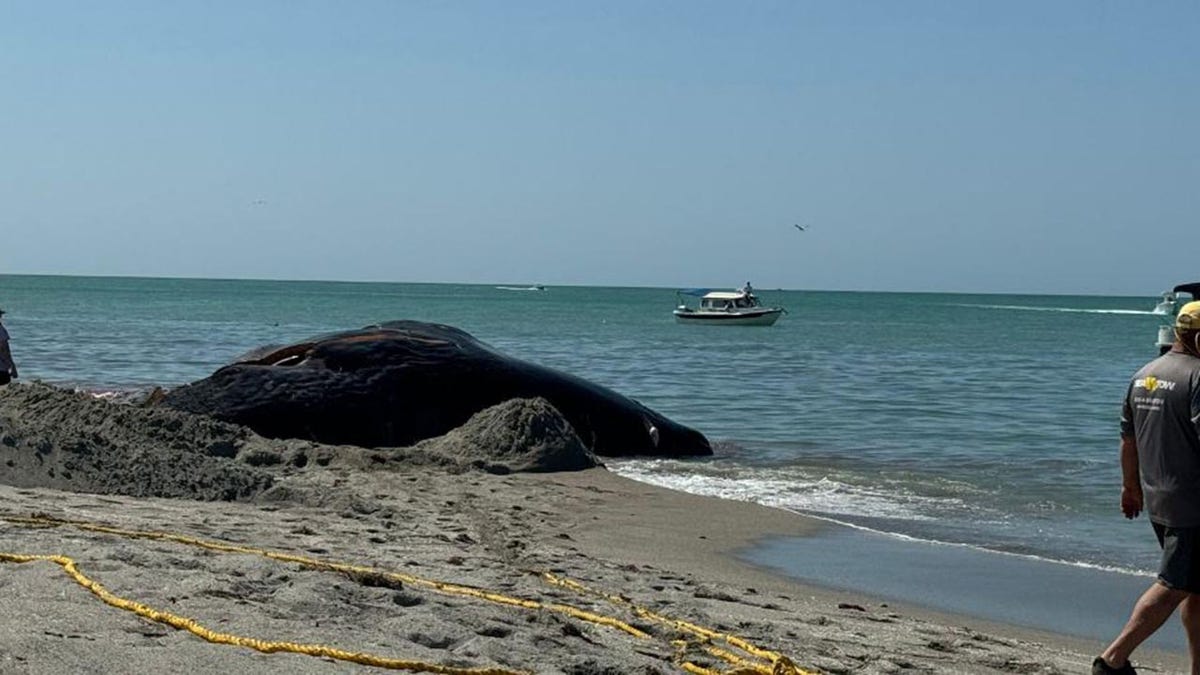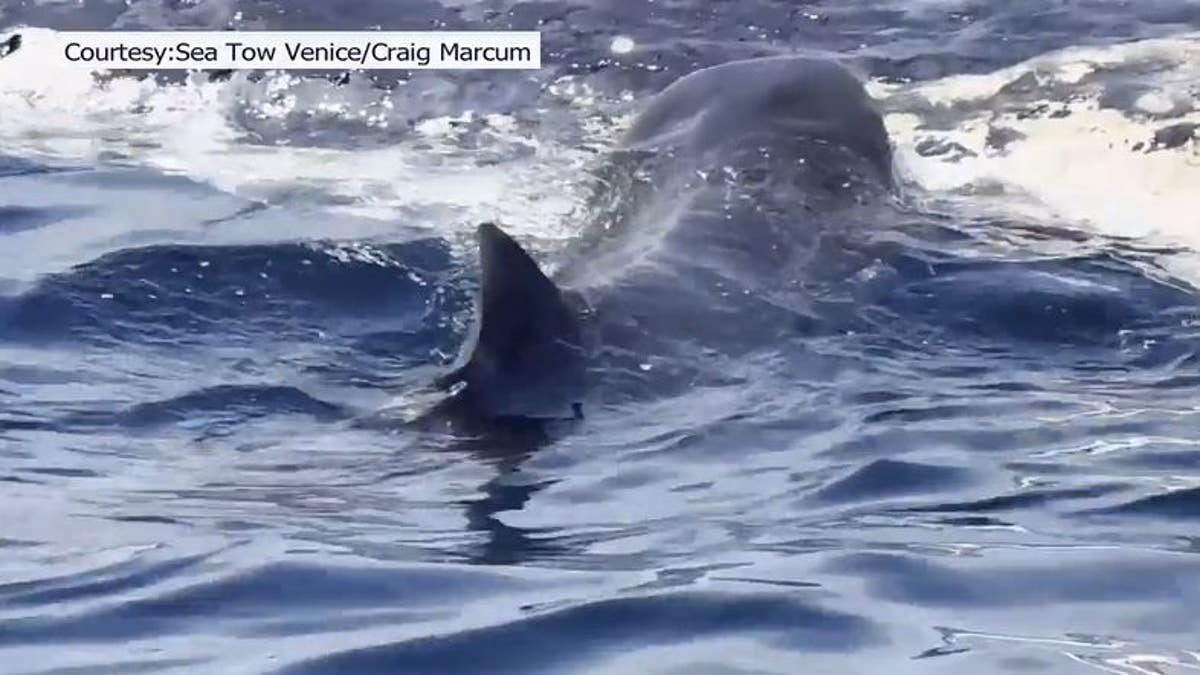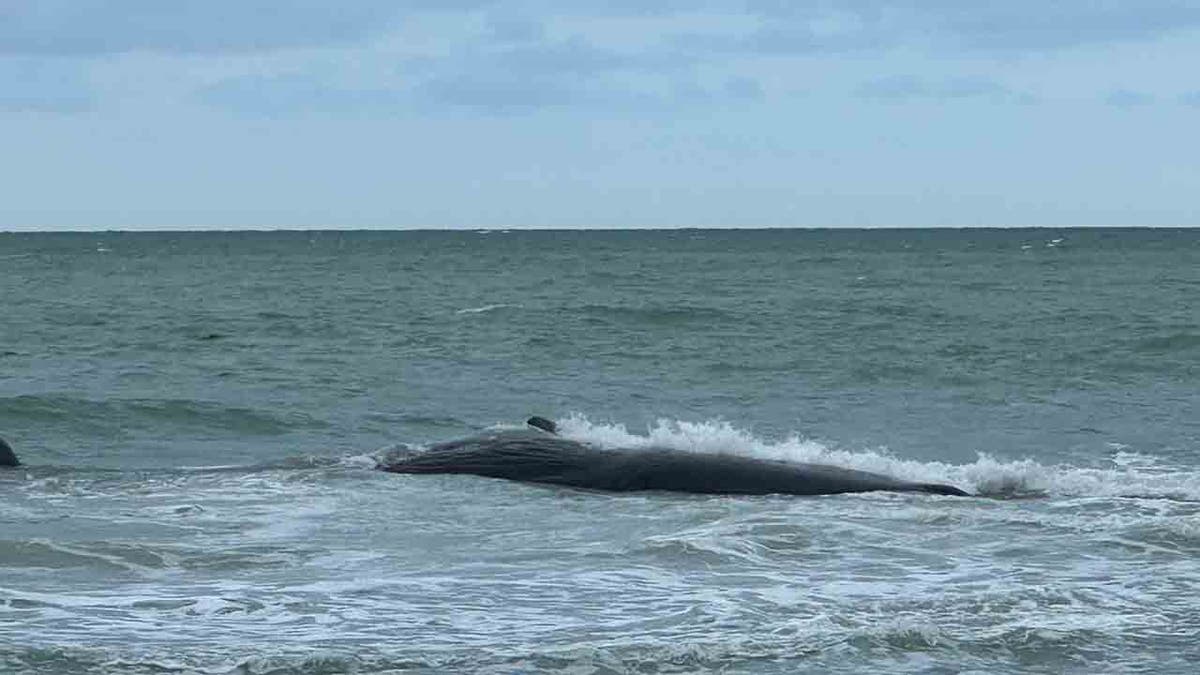Sharks feast on whale carcass in Florida after it's towed out to sea
The whale died this week after it beached itself in Venice, Florida.
The carcass of a whale that beached itself in Venice, Florida, last weekend, was towed back out to sea this week, and the owner of a marine assistance company captured video of sharks feeding on the leviathan — after towing it out to sea.
Capt. Craig Marcum, owner of Sea Tow Venice, told Fox News Digital that he rushed to the beach after getting an alert that a whale was stranded off the coast on Sunday.
"The seas were very rough — they were three to four feet, and the waves were breaking right at the whale on the sandbar," Marcum said.
He said he circled the whale in his boat and made eye contact with the mammal several times.
WHITE SHARKS RECORD-BREAKING JOURNEY OFFERS CLUES TO HELP THE PROTECTED SPECIES

Capt. Craig Marcum, owner of Sea Tow Venice in Florida, said he felt "helpless" when the whale was first beached because experts said towing it back to sea while it was still alive could be dangerous for the animal and for his crew. (Sea Tow Venice)
"Making eye contact with the whale was just hard to describe," Macum said. "I had a helpless feeling, because soon after, a woman named Denise who is a whale stranding expert was on scene, and she said that it’s not a good idea to try to tow this whale. It’ll probably fracture its spine. It might sink your boat. It might kill you."
Marcum said they were forced to wait to help the whale, adding that the mammal "didn’t look right," although he’s not a whale expert, and wasn’t sure if it was sick.
Marcum said the water eventually got so rough that the sheriff’s department had to go back ashore, "and then we came by land and stayed until dark and then, of course, by the next morning the whale had passed" and they were able to start preparing to tow it after the necropsy was done.

A shark feasts on a whale carcass off the coast of Venice, Fla. (Capt. Craig Marcum / Sea Tow Venice)
CARCASS OF PREGNANT GREAT WHITE SHARK WASHES UP ON FLORIDA BEACH
Aided by the Sarasota County Sheriff's Office, Marcum and his Sea Tow vessel towed the deceased whale 15 miles off the Gulf Coast during the next high tide on Tuesday. The next day, they returned to the carcass to make sure no one was tampering with it, and that it wasn’t coming back ashore. That's when Marcum said he saw "multiple tiger sharks feeding on the carcass."
Marcum said his company is partnered with the Mote Marine Laboratory, who headed the beaching incident and the necropsy, adding that he was "impressed by their professionalism and their respect for the whale."
Watching their team do the necropsy was like "watching a skilled surgeon at work," Marcum said. "I was just kind of blown away by how incredible their skills were and how they knew exactly what to do every step of the way."

The whale was stranded on a sandbar about 50 yards from shore, officials said. (Venice Municipal Government)
Gretchen Lovewell of Mote Marine Laboratory told FOX 13: "It’s a gut punch. You know, we get into this because we desperately love animals, but we have to put human safety first and when you have an animal this big thrashing in the surf, the kind of surf we had yesterday, it’s a gut punch. We want to help so badly. We sat out here all day yesterday waiting for that opportunity and, unfortunately, it never came."
Marcum told FOX 13 that taking the whale back to the water was the "best possible" outcome of the situation after the whale died.
CLICK HERE TO GET THE FOX NEWS APP
"We could have had a situation where they cut the whale up and took it to a landfill. That would have been terrible," he said. "We know there was a possibility of burying it on the beach once again. That is kind of a waste, but taking it offshore and letting the cycle of life complete itself and knowing that it was creating life for tens of thousands if not hundreds of thousands of other creatures, maybe even millions, kind of set us at ease knowing that was happening."










































